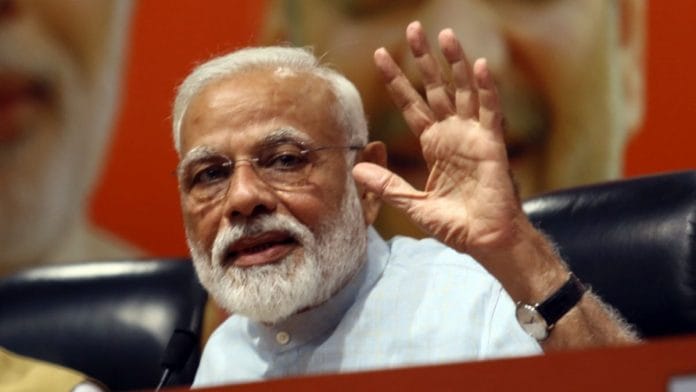New Delhi: Prime Minister Narendra Modi’s victory in 2019 has a much bigger import for Indian politics than his historic win in 2014 when he had got a single party, the BJP, a clear majority in the Lok Sabha after a gap of 30 years.
In his return to power for a second term, he may have changed Indian politics for good — by virtually putting an end to the primacy and dominance of caste-based politics.
To get the latest live updates on the Lok Sabha elections, click here
Look at the fate of caste-based alliances of opposition parties — near-rout of Yadav-Dalit-Muslim-Jat politics of the SP-BSP-RLD in Uttar Pradesh; decimation of Yadav-Muslim-Dalit-Kushwaha-Mallah politics of the Congress-RJD-HAM-RLSP-VIP in Bihar; and of the Vokkaligas of the JD(S) and the Congress in Karnataka, and the rejection of similar caste-based coalitions in other parts of the country.
Also read: Election Results Live: AAP congratulates the BJP on their victory in Delhi, hopes PM Modi will do ‘good work’
Modi had secured a historic win for the BJP in 2014, too, when people across caste lines voted for the party. But, anti-incumbency against the Manmohan Singh government was also a strong factor then. Apart from building a big network of alliances by allying caste-based parties, the BJP had also showcased Modi as an OBC PM then.
The 2019 election was all about Narendra Modi and what he symbolised — a strong leader giving voice to aspirational India cutting across caste divides.
This time, too, the NDA had 42 parties but they were all clearly riding on Modi’s shoulders. It was evident on the ground as ThePrint reporters went on campaign trail in the Hindi hinterland to try to get the pulse of the people.
‘Because of Modi’
Some self-styled leaders of certain castes such as Om Prakash Rajbhar of Suheldev Bhartiya Samaj Party of Uttar Pradesh made the mistake of thinking that the BJP would be weakened if they quit the NDA. The poll results have come as a huge shock to them.
Leaders such as Ram Vilas Paswan of the Lok Janshakti Party and Anupriya Patel of the Apna Dal displayed a better political sense as they stood solidly with the BJP. The trends of the results show their parties are riding the Modi wave even though their candidates were not particularly popular on the ground.
For instance, LJP candidate from Samastipur, Ram Chandra Paswan, was hugely unpopular among upper castes in the constituency but they told ThePrint that they would vote for him nonetheless “because of Modi”.
The prime minister’s personal popularity as a “strong and decisive” leader was, of course, a factor in overcoming identity politics. And so was Balakot air strike against Pakistan that made nationalism a big poll issue. But development works of Modi government also had a strong resonance on the ground.
Whatever be the reasons for the BJP’s superlative performance in this election, Modi has been able to neutralise the decades-old social engineering formula of caste-based parties. And this change may be here to stay.
Also read: Rahul Gandhi could get Amethi shock, trails by over 5,000 votes against Smriti Irani






